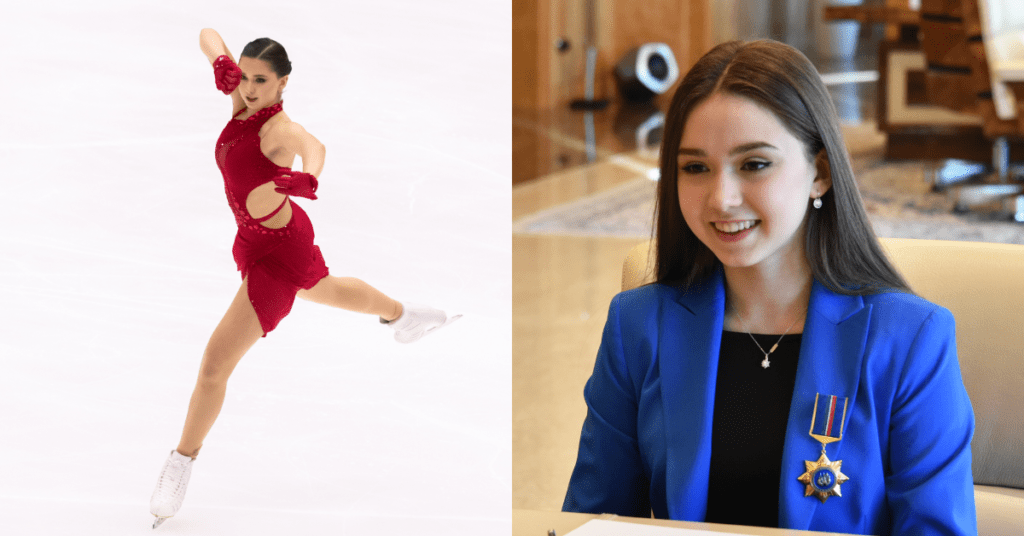In a dramatic turn of events, Russian figure skater Kamila Valieva faces a four-year ban for doping, shaking the foundations of the sports world. Despite an initial clearance by a Russian Anti-Doping Agency (Rusada) investigation, the Court of Arbitration for Sport (CAS) has upheld an appeal by the World Anti-Doping Agency (Wada).

Initial Clearance and the Shocking Appeal
The Rusada investigation initially absolved Kamila Valieva of any wrongdoing, citing “no fault or negligence” for her failed test before the 2022 Winter Olympics at the age of 15. However, Cas’s decision to uphold Wada’s appeal underscores the gravity of the situation, with Wada emphasizing that “the doping of children is unforgivable.”
Backdated Ban and Disqualification of Results
The ban, effective from December 25, 2021, the date of Kamila Valieva’s failed test, includes the retroactive disqualification of all competitive results achieved by the skater. However, the power to strip Russia of the gold medal won at the 2022 Winter Olympics is deemed beyond the scope of Cas’s arbitration procedure.
Age Not a Shield: CAS’s Decision
CAS clarified that Kamila Valieva, now 17, did not contest the presence of the banned substance, and the court was tasked with determining appropriate sanctions. The ruling stated that Valieva failed to establish, on the balance of probabilities, that she had not intentionally committed an Anti-Doping Rule Violation (ADRV), dismissing the notion that age should shield her from accountability.
Kamila Valieva’s Critique and Trimetazidine Scandal
The Kremlin criticized Cas’s ruling as “politicized,” adding a layer of complexity to the controversy. Kamila Valieva had tested positive for the banned heart medication trimetazidine in December 2021, a revelation that unfolded after she contributed to Russia’s team gold in Beijing.
The rollercoaster of Events: From Ban to Lifted Provisional Suspension
The rollercoaster ride for Valieva included a provisional ban lifted by a court, allowing her to compete in the women’s singles event. However, her performance was marred by falls and stumbles, leaving her in tears on the ice.
Rusada’s Investigation and Wada’s Vigilance
A subsequent Rusada investigation cleared Valieva of intentional doping, but Wada remained vigilant, appealing against the finding at Cas. Wada, along with the International Skating Union (ISU), expressed concerns, pushing for a four-year ban and the expunging of all results from December 25, 2021.
Reshaping Medal Standings and ISU’s Response
Cas’s decision not only impacts Valieva’s accolades but also reshapes the team figure skating event’s medal standings in Beijing. The United States is poised to be awarded gold, with Japan and Canada increasing in the rankings.
Wada’s Strong Stance on Doping
Wada welcomed Cas’s decision, emphasizing its pursuit of fairness for athletes and clean sport. The organization stressed the unforgivable nature of doping in children and called for stringent measures against those providing performance-enhancing substances to minors.
Historical Context: Russia’s Doping Woes
The ban on Russian athletes competing under the neutral name of the Russian Olympic Committee (ROC) in Beijing is a continuation of Russia’s doping woes. Cas had previously reduced a ban on Russia, allowing athletes to participate without using the Russian name, flag, or anthem.
The Lingering Fallout and the Road to Paris 2024
The decision’s repercussions will linger, shaping Russia’s future participation in international events. The International Olympic Committee’s allowance for Russian athletes to compete as neutrals in the 2024 Summer Olympic Games in Paris follows a ban stemming from the invasion of Ukraine.
In the aftermath of this long-running saga, the sports world reflects on the complexities of enforcing anti-doping rules, the protection of young athletes, and the ongoing struggle for justice. As the Valieva case concludes, the need for a robust and timely anti-doping framework becomes more evident than ever.
The ban on Kamila Valieva marks a pivotal moment in the ongoing battle against doping in sports. As the sports community grapples with the consequences, questions about accountability, fairness, and the protection of young athletes come to the forefront. The decision sets a precedent and underscores the need for a robust and timely anti-doping framework to preserve the integrity of competitive sports.
Read: Liverpool’s FA Cup Clash: Alexis Mac Allister’s Absence Explained


1 thought on “Russian Figure Skater Kamila Valieva Faces Four-Year Ban for Doping Scandal”